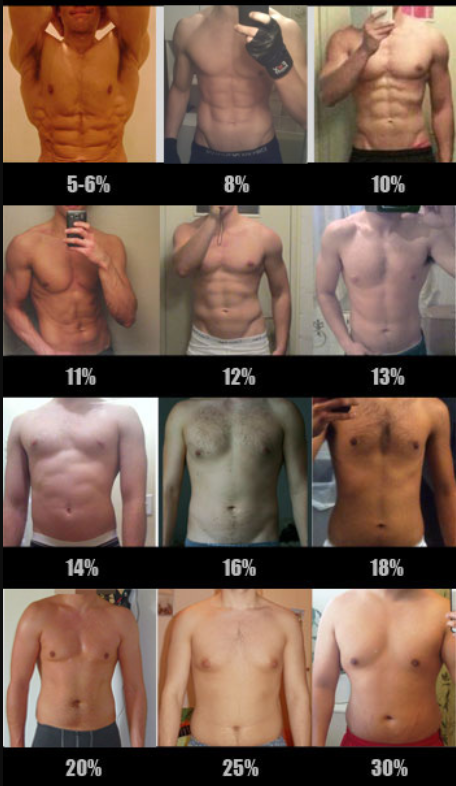Many bodybuilders and strength athletes probably ask themselves this very question. How much pure fat can I lose per week without affecting my muscles? Because one thing is quite clear, it takes quite a long time to build muscle and the worse it is when you do a "classic" diet and at the end of this are the excess kilos of fat gone, but also some of the hard-earned muscle.
The basis to answer this question is quite simple. We all know that you need a calorie surplus to build mass and muscle. Likewise, you need a calorie deficit to lose weight. But how high can this deficit actually be and are there other important factors that influence this and what number is actually realistic... 0.5kg / week, 1Kg / week, 2 Kg / week or is it not possible at all without losing muscle?
That's really a lot of questions that come up, although you just wanted a simple answer 😉.
Even if the whole thing may sound crazy complicated now, it is not at all! There is even a guideline, which you can / should follow to determine the best way for you.
1. nothing works without calorie deficit!
In order to get into the diet mode at all, you need a calorie deficit, i.e. more energy must be consumed / burned than is supplied. Only then do we draw energy from our body's own energy depots = fat depots. Don't worry, because that's what our fat depots have always been there for. The body deliberately stores them for "bad times", when we were not lucky on the hunt and the lion or the mammoth was faster than us, or it is not the time for berries and nuts. Because the body needs energy even in this time to move, so that the brain continues to function and simply to ensure all the functions that our body provides.
2. if you want to be properly defined, you can not lose weight too fast!
There is a very interesting case study (*1) from 2014, which examined 2 natural bodybuilders in competition preparation. Type 1 lost weight the fastest, with 1% body weight loss per week, and Type 2 lost weight the slowest, with 0.5% body weight loss per week. From the study, it appears that Type 1, who lost the most weight the fastest, unfortunately also lost the most lean mass = muscle mass. For example, if type 1 and type 2 had 100kg body weight, type 1 lost 1% = 1kg per week and type 2 lost 0.5% = 0.5kg. What does this tell us now?
Say goodbye to the idea that you have to lose 1 or 2 kg per week. Because unfortunately it doesn't work like that. However, this study also refers to natural bodybuilders in competition preparation, who already have quite little body fat at this point.
In our eyes, a better and also proven approach is to look at what amount of body fat is present in the first place.
3. rule of thumb, with which you are on the safe side!
In another study (*2) from 2004, which we prefer, it was looked at, depending on the fat mass, which an athlete possesses, which deficit may be produced, so that one does not lose lean mass = muscle mass? The result of this study shows that approx. 70 kcal / kg of body fat is the ideal value that you can be in deficit without attacking your muscle mass too much.
For example, if you have 10kg of body fat (regardless of what you weigh) then you may be 700 kcal per day in deficit. The beauty of this study is that nothing was glossed over or artificially optimized. For example, by eating a balanced and protein-rich diet, as well as the use of various supplements such as BCAA, EAA, creatine, etc., you can still slightly increase the Kcal to about 80 kcal / kg, with which you could still extend the deficit a little. This study represents the upper limit if you want to be 100% sure.
4. now what is realistic for me to lose weight based on this formula?
The important thing here is not only what you can lose per week, but also to reduce the "stroke rate" somewhat, the closer you get to your personal goal.
If your KFA = body fat percentage is above 15%, you should lose about 1% body weight per week. If your KFA is 10-15%, you should lose 0.7-0.8% body weight per week, and if your KFA is less than 8%, you should lose only 0.5% body weight per week to ensure that you maintain your muscles.
To find out what your body fat percentage is, you should certainly find a qualified trainer or nutritionist at your gym who can calculate or measure it for you pretty quickly. If this is too much effort for you, here is also a graphic that you can use to orient yourself to where your current body fat percentage is. As always, it is important to be honest with yourself! Because it helps neither you nor your goals if you lie to yourself or cheat something 😉

More articles on the topic

Are extreme diets useful?
Surely everyone who has already gone through one or more diets or is planning to, knows this "phenomenon". You want to start a diet, but you know

Myth: Are low-fat products really healthy?
When it comes to a defined body, low-fat products are high on the trend and making their way into the refrigerator of many fitness devotees. But how healthy are

DIET PLAN TO LOSE WEIGHT - WHAT FOODS MELT BELLY FAT?
Can you specifically burn belly fat or lose belly fat with certain exercises? As much as we would like to tell you otherwise, here is the answer though
Study Reprimand:
1 Kistler BM, Fitschen PJ, Ranadive SM, Fernhall B, Wilund KR. Case study: natural bodybuilding contest preparation. Int J Sport Nutr Exerc Metab. 2014 Dec;24(6):694-700. doi: 10.1123/ijsnem.2014-0016. Epub 2014 Jun 5. PMID: 24901578. https://pubmed. ncbi.nlm.nih.gov/24901578/
2 Schoenfeld BJ, Vigotsky A, Contreras B, Golden S, Alto A, Larson R, Winkelman N, Paoli A. Differential effects of attentional focus strategies during long-term resistance training. Eur J Sport Sci. 2018 Jun;18(5):705-712. doi: 10.1080/17461391.2018.1447020. Epub 2018 Mar 13. PMID: 29533715. https://pubmed.ncbi.nlm.nih.gov/29533715/
